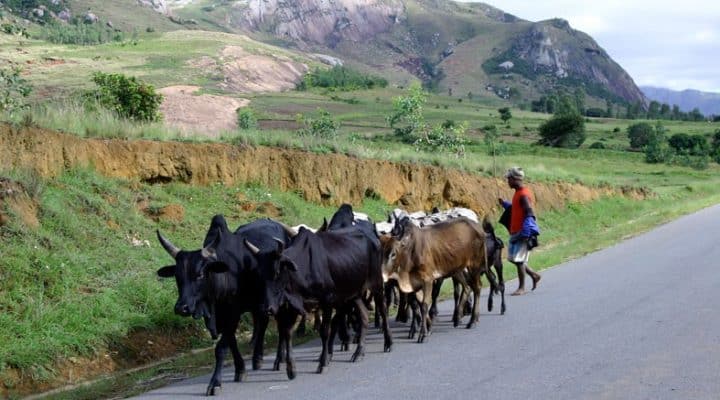When we talk about Madagascar, we can't forget to talk about zebus. These bovids brought by the first Africans who set foot on the soil of the future Madagascar more than 1500 years ago
. At that time we called the island Antanandava . They are among the first tribes to settle on the coast of the island for breeding zebus. At the beginning they left them in wild breeding and they took some at each opportunity. several centuries later this breeding is still confined in the southern part of the island and generated an almost cultural movement of transhumance from south to north. From breeding areas to trading areas.
During colonization, at the end of the second world war period, Madagascar was asked to send skirmish troops but also to supply troops to the front with meat and from there began this transhumance.
In the beginning, we wanted to tranship the animals aboard boats in the south east regions of the island but the boats had a lot of problems in anchoring in these old poorly maintained small ports and this is why the port of Manakara and Farafangana were chosen for these shipments of cattle intended for war fronts.
These animal transports, other countries have also done such as South Africa and Australia.
In Madagascar, this is done in a very old way, that is to say accompany the animals to the boarding ports on foot. And this trip was generally done in about thirty days from the point of departure to the port.
They started in waves from several herds made up of a hundred head each and led by three or four herdsmen. They shared the tasks as if to guide the herd, buy food as you move, set up camp and cook. During that time, stealing zebus on the course practically did not exist. The herd breaks camp early after a few hoof and animal condition checks. They would not make hooves at that time because the asphalt did not yet exist on the island.
In one day they could make about thirty kilometers and to install the camp they privileged the zones of villages where the cattle drivers could fill up with food for the next days.
These herdsmen were not the owners but only conveyors who were paid for the conveyance.
In one year, a herdsman could make two or three convoys and it is the same for the current herders.
Nowadays, this displacement still exists but no longer for a local business, moreover, they can make stops on the way depending on local markets and the number of travel days is even bigger, going from thirty to forty.
Anyway, this culture will last as long as the peoples of the south breed zebus.

